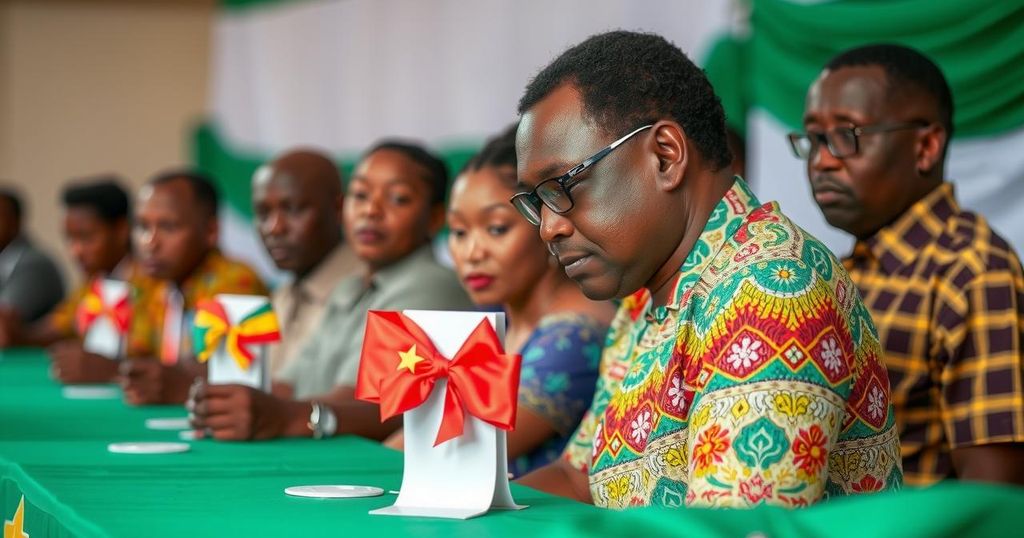Ghana’s recent presidential election, won by John Mahama, exemplified democratic success with high transparency and efficiency, contrasting sharply with Nigeria’s troubled 2023 elections plagued by irregularities and mismanagement. Observers commend Ghana’s meticulous planning, while Nigeria struggles with credibility issues and public trust in its electoral commission (INEC). Critics urge Nigerian officials to prioritize integrity and reform to restore confidence in future elections.
In a recent turnaround, John Dramani Mahama, the former president of Ghana, triumphed in the 2024 presidential election, marking a significant political shift. His opponent, Vice President Mahamudu Bawumia, graciously accepted defeat, stating, “The people have spoken, the people have voted for change at this time and we respect it with all humility.” This election not only showcases Ghana’s commitment to democratic values but also emphasizes the stark contrast with Nigeria’s recent electoral challenges.
The 2024 election has reaffirmed Ghana’s status as a paragon of democracy across Africa, evidenced by considerable praise for its transparency and operational efficiency highlighted by both local and international observers. Mahmood Yakubu, the chairman of Nigeria’s Independent National Electoral Commission (INEC), commended the smooth execution of the election, noting, “We are grateful that the election has gone very well. The process and its outcome so far have been commendable.”
In contrast, Nigeria’s 2023 general elections illustrated significant flaws characterized by irregularities and technological shortcomings, despite an investment of N313.4 billion (approximately $215 million). Concerns about the allocation and deployment of these resources further exacerbated dissatisfaction with the electoral process. While Ghana’s Electoral Commission meticulously planned its procedures, focusing on logistics and public education, INEC grappled with numerous technology failures and logistical incompetencies.
Ghana’s election expenses were markedly lower, reflecting prudent financial management, whereas criticisms of corruption and inefficiency directed at INEC have summoned doubts regarding the justifications for Nigeria’s soaring election costs. A notable element distinguishing the two countries is the level of public trust in their electoral institutions. Ghana’s Electoral Commission has cultivated a solid reputation through its transparent practices, thereby calming electoral tensions, unlike INEC, which faces serious credibility issues clashing with accusations of bias and incompetence.
Additionally, Ghana’s streamlined electoral process contrasts sharply with Nigeria’s complex system involving concurrent elections across various administrative levels, which often overwhelms INEC and complicates logistics. Ghanaian success highlights the imperative of diligent planning, sound financial management, and the cultivation of public trust in executing credible elections.
For Nigeria to enhance its electoral legitimacy, it must address its systemic deficiencies and bolster the integrity of its democratic system. As Nigeria seeks to establish itself as the giant of Africa, the recent success of Ghana underscores the need for a reassessment of its electoral methodologies and institutions. Don Umah, coordinator of Nigeria Voters’ Forum, encapsulated this sentiment, stating, “It is a shame for our electoral institutions who behave like ruling parties at states and federal levels. INEC needs to go back and ask itself questions and redeem its image.”
The comparison between Ghana’s recent presidential election and Nigeria’s past elections provides critical insights into the management and perception of electoral processes in these two West African nations. Ghana’s election, celebrated for its transparency and efficiency, highlights best practices in electoral management that contrast sharply with Nigeria’s struggles marked by mismanagement and public mistrust. Analyzing these two contexts sheds light on the necessary reforms required in Nigeria to improve its electoral integrity and restore citizens’ confidence in its democratic processes.
The recent elections in Ghana serve as a poignant reminder of the significance of transparent electoral processes, efficient resource management, and public trust in democratic systems. As Nigeria confronts its ongoing electoral challenges, it is essential to implement substantial reforms within its electoral bodies, particularly INEC, to ensure future elections are conducted with integrity and efficiency. Without these necessary enhancements, public trust and confidence in Nigeria’s election outcomes are likely to continue diminishing.
Original Source: businessday.ng






